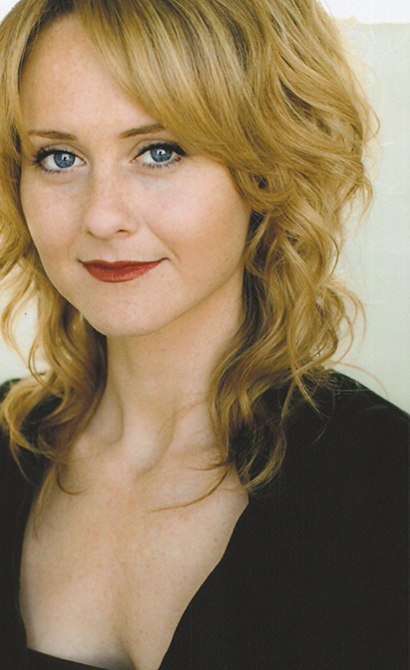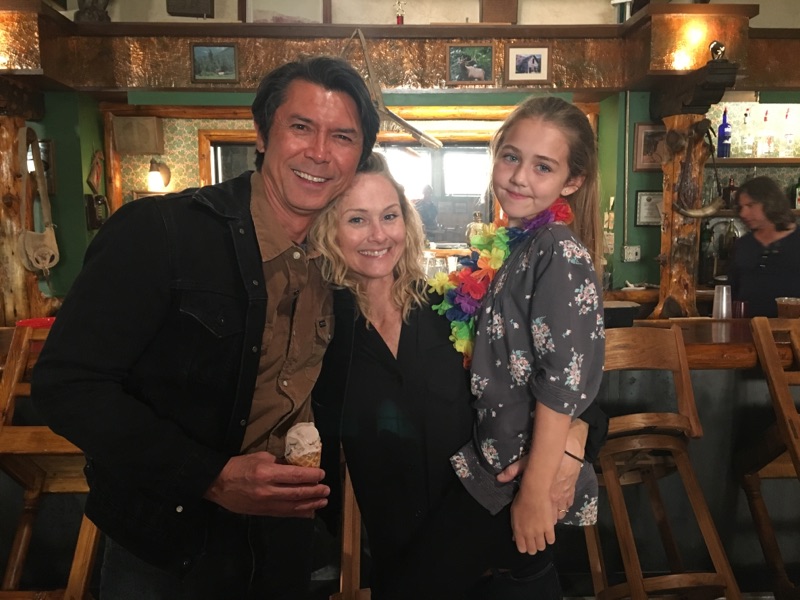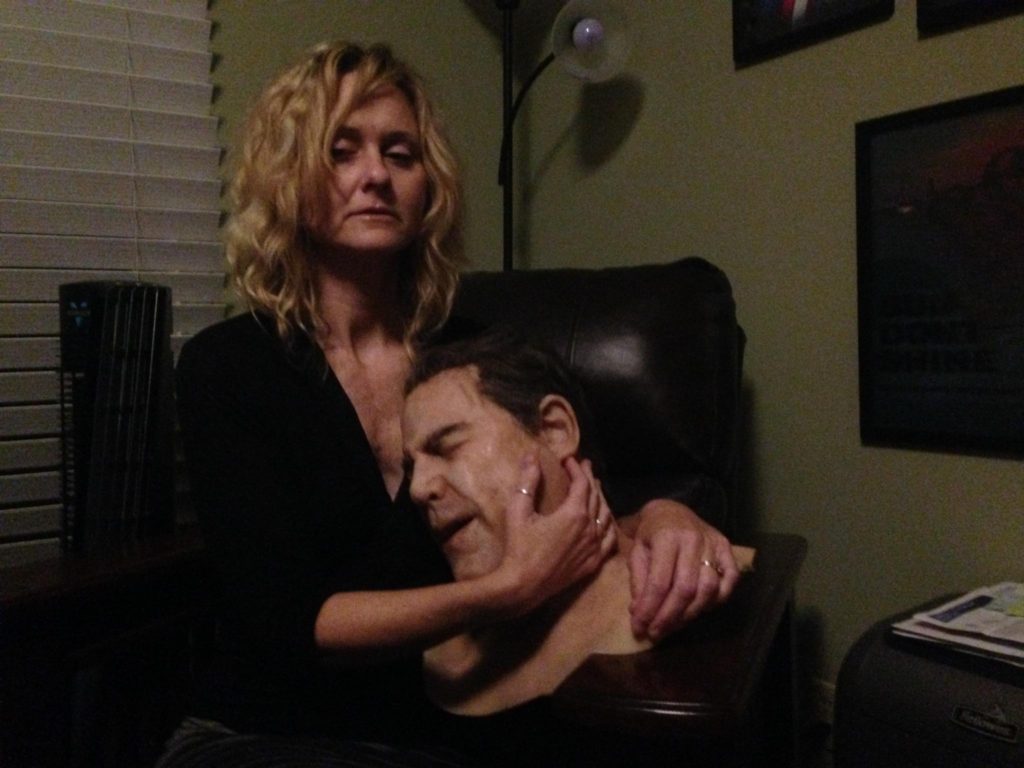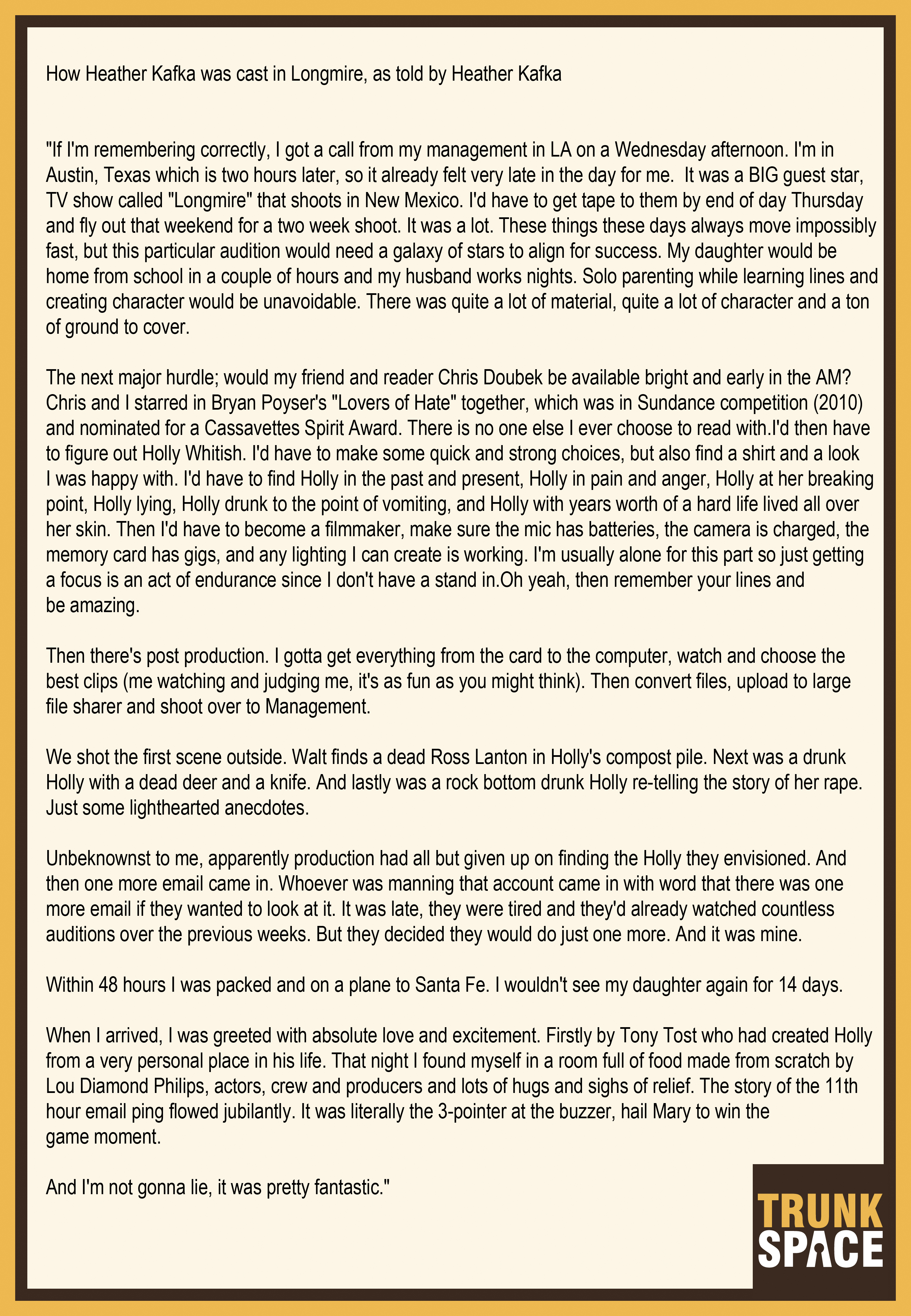 Heather Kafka is the kind of actress who fully and fearlessly immerses herself into a character. She not only becomes the woman inhabiting the fictional world she was cast to portray, but does so with a physicality that is just as much camouflage as it is performance. She doesn’t just star in a project, she lives within it, becoming a part of the narrative in the most organic of ways. It’s a skill set that most actors spend their entire careers striving to obtain and one that seems to come so naturally to Kafka.
Heather Kafka is the kind of actress who fully and fearlessly immerses herself into a character. She not only becomes the woman inhabiting the fictional world she was cast to portray, but does so with a physicality that is just as much camouflage as it is performance. She doesn’t just star in a project, she lives within it, becoming a part of the narrative in the most organic of ways. It’s a skill set that most actors spend their entire careers striving to obtain and one that seems to come so naturally to Kafka.
We recently sat down with the Texas native to discuss her memorable turn in “Longmire,” why there may never be a set like it again, and how many of the characters she has portrayed have been through hell and back.
TrunkSpace: When we spoke with Adam Bartley a few months back and asked him who the most memorable guest stars were to have appeared on “Longmire,” he instantly mentioned your name.
Kafka: Aww. Adam is the best. Huge compliment and I would return the compliment. He is really an awesomely genuine, full of life, warm-hearted, easy to access… just a wonderful, loveable person. And so, so talented. Even more talented than I realized just from “Longmire.” I saw his reel recently and the range of characters he’s able to do is really awesome. He’s amazing. I have a big soft spot in my heart for him.
TrunkSpace: It seems that everyone we have spoken to who has appeared on “Longmire” has had the same experience in working on the show and that is that it was one of the most welcoming sets of all time. Did you have that same experience?
Kafka: Listen, and I’ve said this before and I’m happy to say it again for all of eternity… I’ve worked a long time in this business and I’ve been on many, many television sets and I have never been on a set like “Longmire” ever before and maybe won’t ever again. There’s just something really special with that group of people. I don’t know where it begins and ends. I don’t know who’s responsible, but everyone is in the same place in their heart and it’s very much like a family. From the day that I arrived, I felt like I was part of that family and that is super rare.
The guest star circuit is really hard. I’m not going to lie. You show up on a TV show, surrounded by people who have been working together constantly for however long, and you’re the new kid at school. The way that we do a lot of TV shows these days is that one episode is beginning and concluding within that episode and so there’s a huge arc that you have to cover. It’s usually very dramatic and intense and there’s a lot of heavy lifting for you to do right out of the gates. It’s difficult to feel comfortable doing that anyway, let alone when you show up to, in this case Santa Fe, New Mexico, a place where I don’t live and I don’t know and I’m in a hotel that I don’t recognize and I’m not transporting myself to and from set. You really relinquish a lot of your control and it’s very easy, I think, for people who are already in that established situation to sort of just dismiss you, and not necessarily in a cruel way, but you’re just passing through.
intense and there’s a lot of heavy lifting for you to do right out of the gates. It’s difficult to feel comfortable doing that anyway, let alone when you show up to, in this case Santa Fe, New Mexico, a place where I don’t live and I don’t know and I’m in a hotel that I don’t recognize and I’m not transporting myself to and from set. You really relinquish a lot of your control and it’s very easy, I think, for people who are already in that established situation to sort of just dismiss you, and not necessarily in a cruel way, but you’re just passing through.
TrunkSpace: And they know that you’re only there temporarily, so there’s probably a bit of a defense mechanism involved as well. Why make friends when you know that person will not be sticking around?
Kafka: Exactly. And to do it well it’s probably going to take more time than you’re probably going to have with them. And so, it makes sense why it is the way it is normally, but for “Longmire,” it kind of doesn’t make sense why it’s so amazing. Literally the day that I showed up on set, people were just so welcoming to me. They treated me as if I had been there the whole time. Lou immediately came up to me as if he had known me his whole life and invited me to the cast and crew dinner that he was going to have at his place that night. Apparently it’s something that he does at the beginning of every episode. And so immediately I’m at Lou’s condo in New Mexico where he has made a full spread of food. Not catered. Not hired. Not brought in. He made every single dish from scratch in his kitchen, cooking while we are all there… producers and actors and crew. Everyone was welcome. It was like Thanksgiving. It was just so warm and welcoming and everybody was just so lovely. And that right off of the bat, eases so much of your fears.
TrunkSpace: It must immediately set the tone.
Kafka: Yeah. And it helps you to do your work quickly and better because you feel supported.
And what I will say about “Longmire” is that even to this day, I still feel a part of that family. It’s been a couple of years now and I went to Santa Fe last year as I was traveling and I called up one of the producers and she was like, “You’re coming by set, right?” So we went by the set and we all had a meal. It was like I had never left. It is a very unique family that they have over there and it’s obviously an incredible show that has moved a lot of people and for good reasons.

TrunkSpace: Do you think part of that family atmosphere is nurtured by the fact that the show doesn’t film in LA or Vancouver and instead is sort of set off and isolated from the rest of Hollywood?
Kafka: Absolutely. And it’s one of the great things about when you go on location for a film. You know you’re going to be there for like three months, you hunker down, and you just live in that experience for that time. This is similar to that because nobody really lives there. They live there while they’re shooting and they’re also the kind of people who will thrive in that environment. When they have a few days off, they’ll go camping or they’ll really take in the goodness that New Mexico and the surrounding areas have to offer, as far as quality of life. It definitely helps make you a tighter knit family when you’re all there and that’s all that you’re there for… doing it every day and you don’t have to be like, “Oh, I’ve got to get to the post office today.” All of that is stripped away and you can just focus. So it’s a beautiful environment with these lovely people.
But it could also go the completely opposite direction. You could be stuck in that place where people are miserable and everyone is screaming at each other and being a dictator or being a diva or whatever. There’s just none of that. It’s pretty amazing with “Longmire.”
TrunkSpace: We would imagine in a lot of ways it’s sort of like doing a play where you’re spending so much of your time at the theater that you get to the point where you almost don’t want to go home?
Kafka: Absolutely. To be honest, when I was there and the day that I was supposed to wrap and fly back, the airline’s whole system went down and the planes couldn’t fly. So all of a sudden I was sort of “stuck there” over the weekend and couldn’t go back until a couple of days later. I was A-okay with that. (Laughter)
TrunkSpace: At the time that you shot your episode, the full embrace of the “Longmire” fandom hadn’t really taken hold yet, right?
Kafka: No. It was definitely on the rise though. I got the feeling that the fanbase had just started to get rowdy at that point. There was the Longmire Posse on Instagram and not long after my season wrapped, I remember there being a big fear that they weren’t going to bring the show back and there was a big campaign. They were already having Longmire Days. But I know it has just exploded even more since then. I mean, they’ve managed to keep the show on… whatever it’s going to take. They’ve managed to keep it going.
TrunkSpace: What we find so interesting about your work is that you always go all-in on the physicality of the characters that you’re playing and at times you’re not even recognizable.
Kafka: I like that. That’s the part of it that I like to do. There is so much product these days, I think you can get lazy and you can get away with not going any extra mile in that regard, but I’ve always really liked that element of it. And a lot of times with characters, I’ve found over the years, I start from the outside in. It helps me immensely when I have different shoes on and different clothes and my hair is different. Just those starting points often help me get out of my own habits that I’m not even aware of and discover new ones that I can make habits for my characters and how they hold their pencil or whatever.
TrunkSpace: Where does that embracing of the physicality come from? Is it rooted in theater?
Kafka: You know, I’m willing to bet that it is theatrical. I started in theater when I was about six years old and did theater up until…
I went to the American Academy of Dramatic Arts right after high school and that was the last bit of theater that I did. Those elements are really more emphasized in theater because they’re part of your medium. There isn’t going to be any real background music or editing or whatever, so those physical elements are an aspect that is more at the forefront. I think I have just carried it over into the fact that I’ve always felt most comfortable as a “character” actress, as opposed to any sort of ingènue or leading lady type. I’ve just always been more comfortable molding myself into something that I’m not usually in real life. Even if that means I look like shit! (Laughter) 90 percent of the times my characters have been through shit… hell and back… and they look like it. (Laughter) They look rough.

TrunkSpace: (Laughter) But if a character has been through hell and back, then they should look rough!
Kafka: Exactly! I would feel weird if I was doing all of that and someone was still trying to make me look pretty. (Laughter)
I clean up alright in real life though. I feel okay about it. (Laughter)
TrunkSpace: Are there more of those interesting characters to play now because the content in television has matured and become more character-driven?
Kafka: It is absolutely more character-driven and that’s exciting. The trick now is, as a woman, to be able to get as many interesting characters written for you as there are for men. And also ones that don’t always hold dramatic interest because of some sort of atrocity that has been put upon them. A lot of the times I’ve found that when I’m doing television work, the female characters have had horrible things happen to them that day or that year or whatever and I don’t think it always has to be that way. There’s plenty of fascinating male characters that I can think of… from “Die Hard” to whatever… but with females there’s still an awful lot of, “She’s so and so’s husband.” Or, “She’s so and so’s wife.”
TrunkSpace: It does seem like a lot of strong female characters are strong because something terrible happened to them and that made them who they are, as opposed to just being born and raised to be strong.
Kafka: Right. Exactly. Or, you could just be an interesting person as opposed to having to be a plot device for the interesting person or for someone else. Just to have a life of your own… one that doesn’t necessarily revolve or depend on a male lead or whoever the main protagonist is that we’re supposed to be interested in. And they’re definitely out there. They’re just being played by Glenn Close. (Laughter) So you’ve got to get in there because all of the great actresses are getting them and going for it, as they should.



